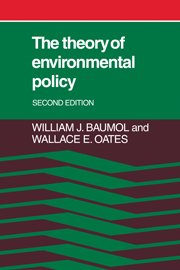Preface to the second edition
Published online by Cambridge University Press: 05 June 2012
Summary
Since the publication of the first edition of this book in 1975, there have been several important contributions both to the theory of externalities and to the design of policy instruments making use of economic incentives for environmental management. Perhaps most important has been the emergence of instruments that control quantity directly rather than through price adjustments; these measures represent an alternative to the standard Pigouvian prescription for a unit tax on activities with detrimental external effects. Since publication of the seminal paper by Martin Weitzman, economists have explored the properties of a system under which the regulatory authority issues a limited number of transferable permits. This work has shown that in a setting of uncertainty, the expected gain in welfare may be higher or lower under such a permit system than under a tax regime, depending on the shapes of the control cost and damage functions. The choice of one system over the other thus depends on the way damages and control costs change with the level of pollution.
At the same time, there has been growing interest at the policy level in the use of transferable permit systems for the attainment of our environmental standards. In the United States, the Environmental Protection Agency has introduced the Emissions Trading Program for the regulation of air quality; this program allows polluters (subject to certain restrictions) to trade emissions entitlements. Environmental economists have studied emissions trading and have, more generally, investigated the properties of a number of variants of transferable permit systems.
- Type
- Chapter
- Information
- The Theory of Environmental Policy , pp. vii - viiiPublisher: Cambridge University PressPrint publication year: 1988
- 16
- Cited by



